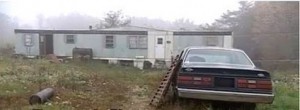Coming from a rural part of the country I have been exposed to many of the troubles facing impoverished populations. Growing up, my father and stepmother lived in a trailer in the northern-most part of Michigan. They worked constantly to make sure their five daughters (between the two of them) had all that they needed, but sometimes this was next to impossible. During the winters, when my sister and I would visit, it was all we could do to stay warm. The grocery store was not within walking distance, and even if it had been, walking through countless feet of snow with enough bags of sustenance to feed seven people for a week was unthinkable. We spent many days hungry, cold, watching movies, just waiting for the snow to melt.
I have always looked back on this period of my life with quite a bit of disdain. And it is entirely involuntary. I in no way blame my father or stepmother, who truly tried incredibly hard to keep us in the dark about how strenuous it was just supplying us with our basic needs. But looking back now, being a 24 year old struggling to afford living one day to the next, without kids, without a mortgage, without even paying for my car insurance(thanks, Mom), I wish it had been easier for them, because I am starting to grasp just what an impossible task they were performing.
Recently I have been contemplating this, and on November 20th I finally had to acknowledge that my complaints are nothing but petty and selfish. Our team attended the Bridges Out of Poverty training, a short two hour meeting in which we were shown the awful conditions in which many people live and how we, working with the less fortunate can better do our jobs. It became very obvious to me that I have been very lucky throughout my life. Yes, there have been times when everything was not perfect but those times were nothing compared to the trials many people face on a daily basis. I always thought I knew what it meant to live in poverty, and to some extent, I would say I still do. As an AmeriCorps VISTA volunteer living in one of the most expensive towns in the country I have had to make a lot of sacrifices just to survive. With less than $200 to live off of every month after paying rent, the struggle in certainly real. But dealing with these problems for a year during my volunteer service or for few months each winter when I was a kid, as opposed to every single day of my life is something entirely different.
During the training we also watched a video, chronicling the life of Tammy Crabtree, a middle-aged single mother living in Ohio, struggling to provide for her family by working at a fast food restaurant for over a decade without so much as a raise. Watching Ms. Crabtree walk 10 miles to and from work each day, seeing the old dilapidated trailer she calls “home” missing vital doors and windows in an unkempt field where the winters are sure to be anything but mild, truly broke my heart.
There are days, even now when I have no idea whether or not I am going to be able to pay my rent. There are nights when I lie awake wondering how I am going to eat for the next week or if the only pair of boots I have are going to survive throughout the rough Colorado winter. But still, I have no idea what it means to lead the lives these impoverished populations live. For me, there is a light at the end of a tunnel; there is something I am working towards, something that will ultimately improve and change the entire trajectory of my life. There is hope. And of all the things those living in poverty go without, I think the absence of hope is likely the most gut-retching disparity to deal with.
Caroline Lallo, VISTA Volunteer
Tri-County Health Network
Watch Tammy Crabtree’s story below:

